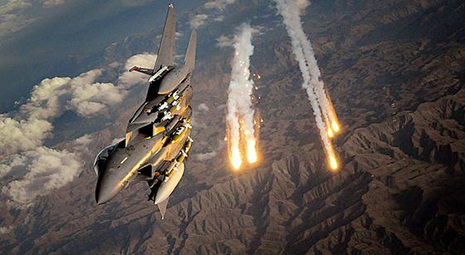Pentagon seeks new weapons to counter China

Missile defense specialists at Lockheed Martin, the main contractor for the Pentagon’s agency, told reporters Wednesday that an extended-range version of the Army’s Terminal High-Altitude Area Defense system is being developed to deal with hypersonic threats.
Hypersonic missiles are maneuvering strike vehicles launched atop missiles that travel at speeds of up to Mach 10, or 10 times the speed of sound. They maneuver and glide along the edge of space, making them difficult targets for missile defenses. Current U.S. missile defense sensors and interceptors are designed primarily to hit ballistic missile warheads that travel in predictable flight paths from launch, through space and into ground targets.
China surprised U.S. intelligence agencies last year by conducting three flight tests of the Wu-14 in January, August and December. The vehicle traveled at speeds up to Mach 10, or nearly 8,000 miles per hour. U.S. intelligence agencies assessed the Wu-14 to be a nuclear delivery vehicle designed to break through U.S. defenses. In addition to China, Russia and India are working on hypersonic strike vehicles. A U.S. test of a hypersonic missile blew up shortly after launch in August. U.S. officials are concerned that hypersonic technology will proliferate to the missile systems of North Korea and Iran, the main focus of current U.S. missile defenses.
“They really do believe they are under siege from all directions, and painting us as an enemy that’s about to invade their country every day is one of the chief propaganda elements that’s held North Korea together for the past 60 years,” Mr. Clapper said. He added that the North Koreans react harshly “to affronts to the supreme leader, whom they consider to be a deity.”
The Sony hack appeared aimed at derailing release of the movie “The Interview,” a comedy about an assassination attempt against Kim Jong-un.
The intelligence chief said he saw the movie. “It’s obvious to me the North Koreans don’t have a sense of humor,” Mr. Clapper said.
WARNING TO TRAVELERS LOOKING TO CUBA
President Obama’s initiative to ease U.S. sanctions against Cuba prompted a State Department-affiliated security group this week to warn travelers to the communist island of “significant” privacy and intelligence recruitment threats.
“The re-normalization of ties between the United States and Cuba does not imply an immediate windfall of U.S. travel, trade, or investment in Cuba,” says the report for security professionals by the Overseas Security Advisory Council, a State Department security group that includes U.S. companies.
U.S. agencies are “expeditiously amending regulations” to ease restrictions on commerce, travel and financial transactions, but the changes will not be put into effect immediately.
“Security professionals should familiarize themselves with the new policy’s implications for the private sector, the Cuban security environment as a whole, and the significant privacy and counterintelligence concerns for conducting business and travel in Cuba,” the report said.
Describing Cuba as a “police state,” the report notes that a large political police presence is deployed throughout the country.
“Americans visiting Cuba should be aware that any on-island activities could be subject to surveillance and contact with Cuban citizens monitored closely,” the report said. “The government maintains strict control over communications networks and Internet access, so there should be no expectation of privacy.”
Cuba also detains U.S. citizens suspected of undermining state security, without any due process, such as the arrest of U.S. government contractor Alan Gross in 2011. Mr. Gross was released as part of a prisoner swap when President Obama announced the Cuba policy Dec. 17.
“Conversely, Cuban intelligence services may seek to exploit the services of U.S. citizens to advance their intelligence and operational needs,” the report said.
A 2011 FBI counterintelligence report stated that “U.S. campuses of higher education have, and continue to be, targeted by foreign intelligence services that wish to recruit university-level students and teachers for espionage against the U.S.”
“The report highlights two cases of espionage against the U.S. committed by educators recruited by Cuban intelligence services,” the report said.
New regulations allow U.S. citizens to travel to Cuba with no special permission under a “general license” that does not require approval from the Treasury’s office of foreign assets control. However, “pleasure tourism” to Cuba remains prohibited until Congress changes sanctions laws.
The report said U.S. businesses can expect opportunities in Cuba after the Treasury and Commerce departments loosen sanctions, but it warned that American businesses should “assess Cuban willingness and preparedness” for interaction with the U.S. market.
The lack of infrastructure, notably the fact that only 5 percent of Cubans can access the Internet, also will pose obstacles to trade, investment and travel in a “poorly-connected market.”
The report also cautions that the president’s major shift in U.S. policy could be blocked by Congress if it declines to change sanctions laws.
“According to U.S. legislation, the embargo may not be lifted until Cuba — among other requirements — holds free and fair elections and abandons communism in favor of democratic governance,” the report said. “Although Cuban President Raul Castro intends to depart office in 2018, he reaffirmed Cuba’s commitment to single-party Communist rule only days after restoring relations with the U.S.”















































